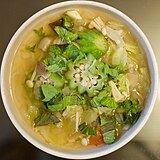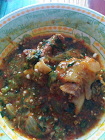Okra soup

Okra or Okro soup is prepared using the edible green seed pods of the okra flowering plant as a primary ingredient. It is greenish in colour. Okra has a slippery feel when rubbed with the fingers. The edible green seed pods can also be used in stews and soups.[1]
Nigeria[]
In Nigeria okra soup is a delicacy, the plants name derives from the Igbo language. In Yoruba, it is referred to as obe lla.[2][self-published source]
China[]
Chinese okra soup is a "country style dish often served at family meals".[3]
Indonesia[]
In Indonesian cuisine okra soup is called sayur oyong, usually served in clear chicken broth with rice vermicelli (bihun) or mung bean vermicelli (sohun), with slices of bakso (ground beef surimi).
Japan[]
In Japanese cuisine, okra and nagaimo are usually used as an addition or variation to soybean paste miso soup.
United States[]
In the United States, the first recipe for okra soup was published in 1824 in the book The Virginia Housewife.[4][5] After this initial publication, okra soup was commonly included in American cookbooks.[4] In the late 1800s, okra soup recipes were commonly published in The New York Times.[6] In the U.S., okra soup has been prepared using canned okra.[7] It is a traditional soup in Savannah, Georgia and Charleston, South Carolina.[8]
Preparation[]
Dice the okra into desired shapes and set aside. On medium heat, add little quantity of water into the pot, add stock fish, meat, ponmo,[what language is this?] crayfish, pepper, salt, seasoning cubes, iru (locust beans), potash and allow to boil for 10 to 15 minutes. Add the diced okra into the pot, stir and allow to boil for 5/10 minute. Add little quantity of palm oil and steam for few minute.
Gallery[]

okra - Soup

Miso soup with okra and nagaimo

Nigerian ofe araga okra soup

Okro Soup
See also[]
References[]
- ^ Walker, S.S. (2001). African Roots/American Cultures: Africa in the Creation of the Americas. Rowman & Littlefield Publishers. p. 64. ISBN 978-0-7425-0165-2.
- ^ Badiru, I.; Badiru, D. (2013). Isi Cookbook: Collection of Easy Nigerian Recipes. iUniverse. ISBN 978-1-4759-7671-7.
- ^ Aksomboon, K.; Aksomboon, S.; Hiranaga, D.; (Restaurant), Siam Cuisine (1989). Thai Cooking from the Siam Cuisine Restaurant. North Atlantic Books. p. 60. ISBN 978-1-55643-074-9.
- ^ a b Smith, A.F. (2013). Food and Drink in American History: A "Full Course" Encyclopedia [3 Volumes]: A "Full Course" Encyclopedia. ABC-CLIO. p. 424. ISBN 978-1-61069-233-5.
- ^ Smith, A.F. (2007). The Oxford Companion to American Food and Drink. Oxford Companions. Oxford University Press, USA. p. 551. ISBN 978-0-19-530796-2.
- ^ Hesser, A. (2010). The Essential New York Times Cookbook: Classic Recipes for a New Century. W. W. Norton. ISBN 978-0-393-24767-1.
- ^ The Picayune Creole Cook Book. Times-Picayune publishing Company. 1922. p. 18.
- ^ Deen, P.; Clark, M. (2011). Paula Deen's Southern Cooking Bible: The New Classic Guide to Delicious Dishes with More Than 300 Recipes. Simon & Schuster. ISBN 978-1-4165-6407-2.
Further reading[]
- Good Housekeeping. 1889. p. 183. – Poor-Man's Okra Soup
- Fowler, D.L.; Carrington, J.R. (2008). The Savannah Cookbook. Gibbs Smith, Publisher. p. 60. ISBN 978-1-4236-0224-8.
- Nzeadibe, R.E. (2009). The 2nd Migration. Xlibris Corporation. p. 55. ISBN 978-1-4653-2783-3.[self-published source]
External links[]
| Wikimedia Commons has media related to Okra soup. |
- Video: Nigerian Okra Soup
- Video: Nigerian Okra Soup with Fresh Fish & Assorted Meat
- Easy Nigerian Okra Soup Recipe
- Vegetable soups
- Igbo cuisine
- African soups
- Vegetable dishes of Indonesia
- Yoruba cuisine
- Okra dishes
- African cuisine stubs
- Soup stubs



